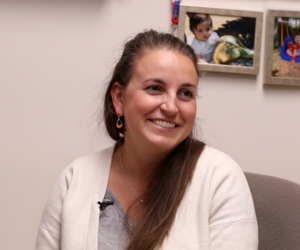
© Provided by WNCN Raleigh ETSU home to state’s second gambling treatment clinic
JOHNSON CITY, Tenn. (WJHL) — Most people who gamble don’t wind up having any serious problems with that pastime, but about 6% of those who roll the dice will develop at least some problem, and an even smaller number will have serious issues.
Serious enough, East Tennessee State University (ETSU) clinical psychology professor Meredith Ginley said, to break up families or lead to job loss, bankruptcy or worse.
“This is something people don’t talk about,” said Ginley, who specializes in treating gambling problems through counseling. “You’ve done damage to your family, you’ve done damage to your finances, maybe you’ve lost your house because of this — and (people will say) ‘it was just a slot machine, didn’t you know the odds, how were you so stupid’ — there’s a lot of stigma there.”

© Provided by WJHL Tri-Cities Meredith Ginley is heading up ETSU’s new clinic to treat gambling disorder. (WJHL photo)
There shouldn’t be, Ginley said, especially with a rise in legalized gambling likely to push the number of Tennesseans who experience serious problem gambling beyond its estimated 100,000. But Tennessee’s sole clinic for problem gambling in the state of Tennessee was at the University of Memphis (UM) — until now.
Ginley and her mentor from UM, James Whelan, collaborated on a $1.2 million grant application, and now ETSU offers its own clinic affiliated with Memphis’s The Institute for Gambling Education and Research (TIGER). ETSU’s center, which uses graduate student therapists as well as Ginley, offers in-person and telehealth services with a six to eight-session course of counseling for the typical duration.
“The students that work for me will get specific specialized training in treating gambling disorder, which will then be more people in the workforce who know how to do this and talk about this and help people,” she said, adding that when clients call, they will work with students under her supervision.
Ginley, who wrote the grant for the new clinic over the Christmas break, said she’s seen people’s lives devastated by problem gambling. She’s seen them turned around through the help of counseling and hopes the clinic here can accomplish — something Tennessee’s Department of Mental Health and Substance Abuse Services (MHSAS) envisioned when legislators carved out money for gambling treatment after legalizing sports betting a couple years ago.
That new option for Tennesseans resulted in $5 billion being wagered in less than two years. In addition to that option, the new casino in Bristol, Va. brings many more people in the region within the 90-mile radius that Ginley said people tend to be willing to travel to casinos.
Ginley said gambling treatment, if it happens at all, has enough nuances to make specialized care worthwhile, she said.
“Gambling treatment kind of gets lumped in with mental health treatment, general addiction treatment. Because our clinical has this specialized experience related to gambling we are hoping we can get people a very tailored, specific to their needs and maybe better, faster outcomes.”
The center is operating already, and Ginley said whether people want to pursue “harm reduction” — cutting back without completely abstaining from gambling — or total abstinence, the center can help them. She said she’s been part of helping people before while working with TIGER.
“They’re able to talk to us, share with us their goals, what’s bothering them, what they want to change, and we can work with them to tailor skills (to curb the compulsion to gamble),” she said. Counselors also help clients develop strategies if they’re trying to pay back money that shouldn’t have been spent, connect them with external resources, even help them find the best bankruptcy lawyer if that’s what is needed.
She remembers working with a client whose partner had lost a great amount of trust in him due to the impacts of problem gambling.
“Worked with the skills over the course of 8, 9 weeks and it kind of culminated with him bringing her in and telling her what he’d learned and how he was going to change and what strategies he was going to use moving forward. She was able to collaborate and share with him how he could further expand on his goals to better make her feel comfortable in trusting him… It was really impactful on the whole family unit.”
The treatment isn’t covered by insurance and costs $300, but Ginley said the center won’t turn anyone away.
“I don’t want anyone to see payment as a barrier. We want them to come. We understand that part of this disorder is that you often have financial constraints so we don’t want you to not get help because you are stuck financially. We explicitly want you to call us and we will figure it out.”
The only pre-requisite is that people receiving care have to do so while inside the state of Tennessee, whether that’s telehealth or in-person. Anyone interested in a consultation or having any questions can email [email protected], or email or call Ginley at [email protected] or (423) 439-4113.
More information about TIGER is at memphis.edu/gamblingclinic.
Copyright 2022 Nexstar Media Inc. All rights reserved. This material may not be published, broadcast, rewritten, or redistributed.
For the latest news, weather, sports, and streaming video, head to WJHL | Tri-Cities News & Weather.